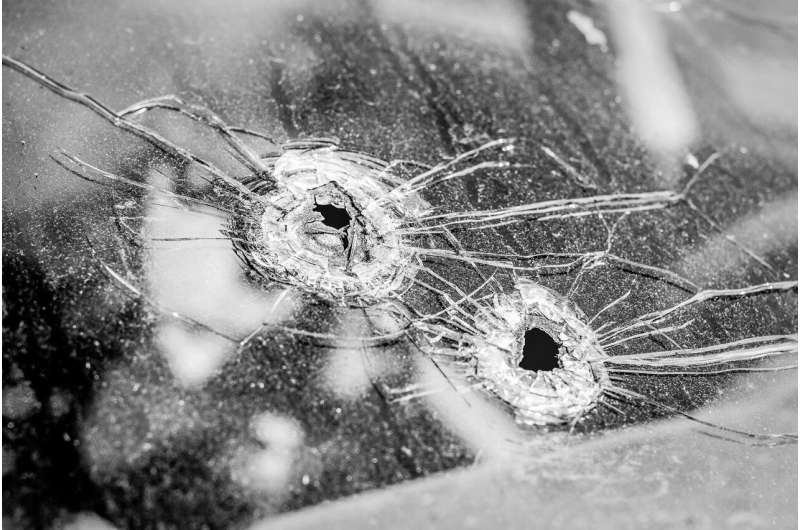Managing mental health amid gun violence

The past few years have been difficult for the city of Philadelphia and its citizens. Not only did Philadelphians have to prioritize safety from COVID-19, they were also surrounded by increased gun violence. In 2021, Philadelphia saw a record number of 486 homicides by shooting as well 1,846 non-fatal shootings. While numbers are down slightly from 2021, the city—on the heels of a mass shooting in South Philadelphia—is still experiencing a surge in shootings over the last two years
Gun violence is a serious concern not just in Philadelphia, but nationally as well. And it comes as no surprise that gun violence can have a lasting effect on the mental health of victim's families and loved ones. But it can also have a negative impact on the mental health of those who are not directly affected by it. With the plague of gun violence that has covered Philadelphia recently, it is important to understand the effects in can have all its residents.
The effects of gun violence on mental health
According to Clinical Psychologist Leah Blain, Ph.D., exposure to trauma, including to gun violence, increases the risk of negative health outcomes like post-traumatic stress disorder (PTSD), anxiety, and depression. These disorders can cause and exacerbate a wide range of physical health concerns, such as hypertension, pain, and even gastrointestinal issues.
Blain, who is the clinic director for the Penn Steven A. Cohen Military Family Clinic in Psychiatry—which provides mental health treatment for veterans and their families at no costs—explains that if someone is already suffering from PTSD, surrounding gun violence can trigger symptoms such as hypervigilance, nightmares, and unwanted trauma memories.
Furthermore, gun violence in surrounding areas can create worry for individuals in the community. This worry may cause them to make drastic changes to their everyday lifestyles. For example, some may be hesitant to stand at a local bus stop for extended periods of time or they might refrain from being out in the community as much as possible. "This can reduce both healthy physical activity and diminish community connection and support. Losing social support is a critical issue since perceived social support is the number one predictor of recovery after trauma," Blain shares.
Managing mental health after gun violence
If you know anyone who is directly affected by gun violence, "social support is key" according to Blain. Showing your concern and support can make all the difference for someone's recovery. Small actions such as a text message, asking if they want some company, or dropping off a meal can make a huge difference.
A heightened sense of risk is common after highly-publicized violent events happen locally. But it is important to keep an eye on your thoughts, said Blain. When we feel danger is close by, we tend to overestimate how risky things actually are. Blain recommends asking yourself: "How likely is it that I would actually get hurt going there?" or "What would someone whose judgment I trust think about this situation?" to get some perspective on the actual level of risk.
Overall, it is normal to experience emotional and physical reactions following a traumatic event. Blain explains "these reactions can include fear, anger, guilt, or feeling 'on guard' or jumpy, having upsetting memories, and trying to avoid reminders of the trauma." Importantly, most people who experience a traumatic event such as gun violence will not develop PTSD. "Those reactions immediately after a trauma do not indicate PTSD, and for most people these symptoms will gradually decrease over time."
However, if it has been several weeks or months since the traumatic event and someone is still experiencing these symptoms, such as heightened reactions, anxiety, a depressed mood, or unwanted memories of the trauma, it could be time to consider seeking professional support to assist in the recovery process. If the prolonged symptoms are interfering with relationships or daily life, and especially if the individual is experiencing symptoms of depression (like not enjoying things they typically enjoy, low mood, feeling bad about themselves, etc.) or suicidality, mental health treatment can make a big difference, stressed Blain.
Other signs it might be time to reach out include feeling angry or irritable, increased conflicts at home, sleep problems, difficulty concentrating, avoiding thinking about the traumatic event, and significant distress when thoughts of the trauma come up.
PTSD is treatable, as are any feelings of increased depression or anxiety. Treatment for PTSD, which Blain says should include trauma-focused psychotherapy or talk therapy, can be completed in as little as eight to 12 weeks, and treatment options have been backed by decades of studies.
"The most important thing to know about PTSD is that it's treatable," Blain says. "While we can't undo the traumatic events, we can help people recover from trauma so that they can reclaim their lives and feel like themselves again."





















